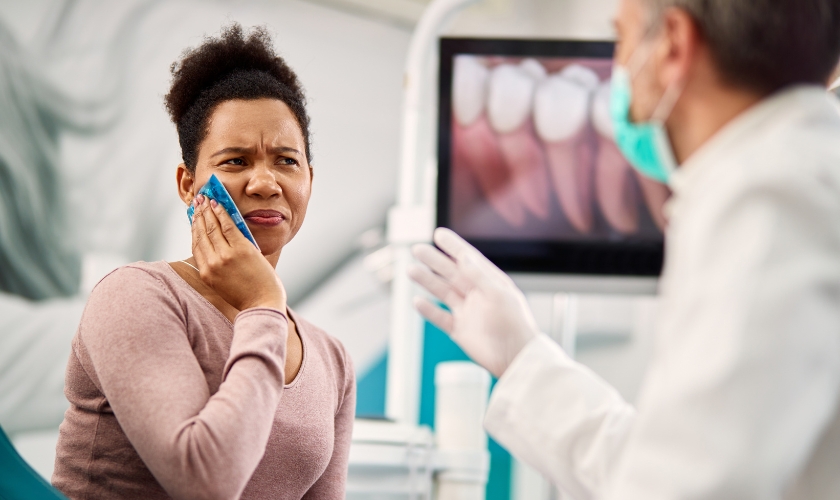We accept Medicare
Is a Lost Filling Considered a Dental Emergency?

You’re snacking on your favorite food, and before you know it—crunch! Something doesn’t feel right. You touch your tongue to your tooth, and there it is: a missing space where your filling was. Panic strikes. Is this a dash to the emergency dentist in Orlando? Or can you see this through till your next visit? Losing a filling is more than a mere nuisance—it can create some real problems for your teeth if not attended to. So, is a lost filling an actual dental emergency? Let’s analyze.
What Occurs When You Lose a Filling?
Fillings shield teeth from bacteria and decay. When one comes out, your tooth is exposed, providing the ideal setting for bacteria to enter. Here’s what could occur:
- Sensitivity sets in – Without the filling, your tooth can respond to hot, cold, or sweet foods.
- Pain or discomfort – Some cases cause mild sensitivity, while others trigger sharp pain.
- Risk of infection – Open areas in your tooth allow bacteria to settle in, increasing the risk of decay or even an abscess.
- Tooth structure weakness – A missing filling leaves your tooth vulnerable to fractures or further damage.
Overlooking a lost filling can make a small problem become a large one. But should you run to an emergency dentist right away?
When a Lost Filling is an Emergency
Not all lost fillings need immediate treatment. But some cases do need prompt attention. If you feel any of the following, contact an emergency dentist in Orlando immediately:
- Severe pain – If your tooth is aching or the pain is too much, don’t hesitate.
- A jagged or sharp edge – This will slice your tongue, cheek, or lips, and eating and talking will be painful.
- Infection signs – Swelling, pus, or a foul taste in your mouth might be an infection that requires a visit to the dentist immediately.
- A deep cavity – If a big part of your tooth was filled, the rest of the structure may not be stable without it.
- Trouble eating – If you can’t chew without pain, it’s better to have the problem fixed right away.
If none of these, you might be able to wait a little while for a routine dental visit. But you still need to move quickly to avoid further complications.
Temporary Measures Until You Can See a Dentist
If you can’t see a dentist immediately, there are some temporary things that you can do to safeguard your tooth until then:
- Don’t bite or chew on the side that hurts to avoid further injury.
- Apply dental wax over sharp edges to avoid irritation.
- Rinse with warm salt water to kill bacteria and alleviate discomfort.
- Use clove oil for temporary pain relief.
- Use over-the-counter dental cement (available at most pharmacies) to form a temporary protective coating.
These are temporary solutions. Visiting a dentist as soon as possible is still the best option.
How Do Dentists Repair a Lost Filling?
After you go to a dental clinic, your dentist will evaluate the damage and decide how to restore your tooth. Here’s what happens:
- Disinfecting the area – Any remaining decay or bacteria is cleared out before filling the tooth.
- Replacing the filling – In case the supporting tooth structure is in good shape, a new filling will be done.
- Thinking about other treatment – If the destruction is considerable, a crown will be necessary.
- Assessing the reason – If fillings continue to fall out, your dentist will consider a different material or adjust your bite relationship.
How to Prevent Fillings from Falling Out?
No filling lasts forever, but proper care can make it last longer. Here’s how to avoid future accidents:
- Practice good oral hygiene – Brushing twice a day and flossing every day prevents decay underneath fillings.
- Avoid hard, sticky foods – Biting hard candy or ice can knock fillings out.
- Wear a night guard if necessary – Grinding or clenching teeth can wear down fillings over time.
- Get regular dental checkups – Regular visits help catch small problems before they become bigger ones.
A missing filing is not to be taken lightly. Though it will not necessarily call for an urgent emergency appointment, it does require prompt treatment. If you are hurting, experience signs of infection, or have issues with eating, call an emergency dentist in Orlando immediately. Otherwise, cover the tooth briefly and make an appointment for a dental exam before things get out of hand. Acting quickly now can prevent larger dental problems later.



